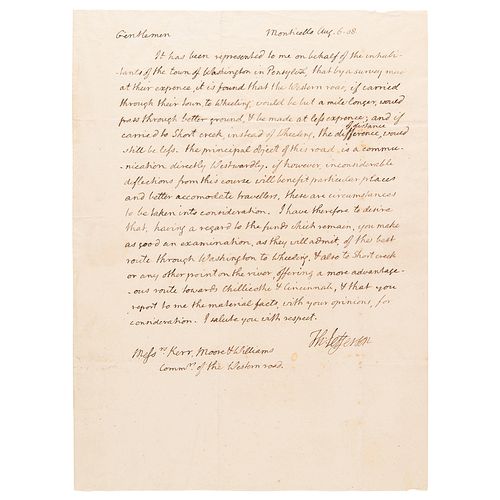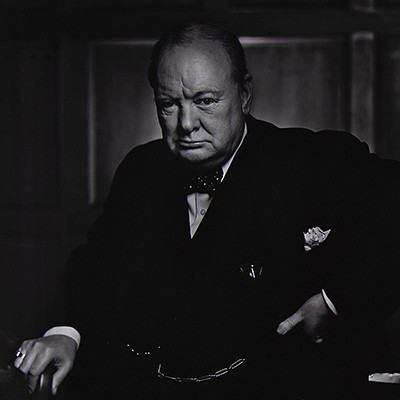Thomas Jefferson Autograph Letter Signed as President on "the Western road" - The First Federally Funded Highway
Two ways to bid:
- Leave a max absentee bid and the platform will bid on your behalf up to your maximum bid during the live auction.
- Bid live during the auction and your bids will be submitted real-time to the auctioneer.
Bid Increments
| Price | Bid Increment |
|---|---|
| $0 | $5 |
| $50 | $10 |
| $200 | $25 |
| $500 | $50 |
About Auction
Feb 22, 2024
RR Auction's first-ever February installment of its Remarkable Rarities series brings some 50+ pieces of history to the auction block, representing the most elusive and extraordinary items offered all year. RR Auction support@rrauction.com
- Lot Description
Historically significant ALS as president signed "Th: Jefferson," one page, 7.25 x 9.5, August 6, 1808. Handwritten letter to Messrs. Kerr, Moore & Williams, commissioners of the Western Road. In part: "It has been represented to me on behalf of the inhabitants of the town of Washington in Pensylv'a, that by a survey at their expence, it is found that the Western road, if carried through their town, to Wheeling, would be but a mile longer, would pass through better ground, & be made at less expence; and if carried to Short creek, instead of Wheeling, the difference of distance would still be less. The principal object of this road is a communication directly Westwardly. If however, inconsiderable deflections from this course will benefit particular places and better accommodate travellers, these are circumstances to be taken into consideration. I have therefore to desire that, having a regard to the funds which remain, you make as good an examination, as they will admit, of the best route through Washington to Wheeling, & also to Short creek or any other point on the river, offering a more advantageous route towards Chillicothe & Cincinnati, & that you report to me the material facts, with your opinions, for consideration." In fine condition.
Like Washington before him, one of Jefferson's major concerns was strengthening the union between the growing American settlements on the far side of the Alleghenies and the eastern seaboard states, both commercially and politically. While Washington made progress toward that goal via waterways with the privately financed Patowmack Canal, Jefferson was committed to constructing a public road. The 'Cumberland Road,' later called the 'National Road,' was authorized by Congress in 1806, and Jefferson articulated its necessity in his annual message, saying that 'new channels of communication will be opened between the states; the lines of separation will disappear, their interests will be identified, and their union cemented by new and indissoluble ties.'
The same year, Jefferson allocated $30,000 for the survey to which he refers in this letter, articulating that "the principal object of this road is a communication directly Westwardly." Construction would not begin until after his presidency in 1811, and after an interruption from the War of 1812, the route to Wheeling was completed in 1818. Over the next few years, the road was extended through Ohio, Indianapolis, St. Louis, and eventually to Kansas City and Denver. It ultimately became the first federally funded road and was fondly called the 'main street of America.' Today the original route is largely followed by US Highway 40. According to ABPC, this is the only Jefferson letter discussing the national road to appear at auction in the last 40 years. A remarkable, significant letter regarding one of the key accomplishments of his administration. - Shipping Info
-
Bidder is liable for shipping and handling and providing accurate information as to shipping or delivery locations and arranging for such. RR Auction is unable to combine purchases from other auctions or affiliates into one package for shipping purposes. Lots won will be shipped in a commercially reasonable time after payment in good funds for the merchandise and the shipping fees are received or credit extended, except when third-party shipment occurs. Bidder agrees that service and handling charges related to shipping items which are not pre-paid may be charged to a credit card on file with RR Auction. Successful international Bidders shall provide written shipping instructions, including specified Customs declarations, to RR Auction for any lots to be delivered outside of the United States. NOTE: Declaration value shall be the item’(s) hammer price and RR Auction shall use the correct harmonized code for the lot. Domestic Bidders on lots designated for third-party shipment must designate the common carrier, accept risk of loss, and prepay shipping costs.
-
- Buyer's Premium



 EUR
EUR CAD
CAD AUD
AUD GBP
GBP MXN
MXN HKD
HKD CNY
CNY MYR
MYR SEK
SEK SGD
SGD CHF
CHF THB
THB




